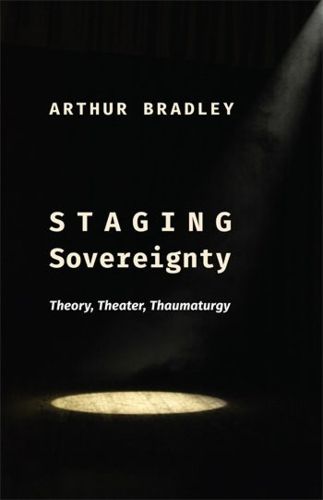Readings Newsletter
Become a Readings Member to make your shopping experience even easier.
Sign in or sign up for free!
You’re not far away from qualifying for FREE standard shipping within Australia
You’ve qualified for FREE standard shipping within Australia
The cart is loading…






To become sovereign, one must be seen as sovereign. In other words, a sovereign must appear-philosophically, politically, and aesthetically-on the stage of power, both to themselves and to others, in order to assume authority. In this sense, sovereignty is a theatrical phenomenon from the very beginning.
This book explores the relationship between theater and sovereignty in modern political theory, philosophy, and performance. Arthur Bradley considers the theatricality of power-its forms, dramas, and iconography-and examines sovereignty's modes of appearance: thrones, insignia, regalia, ritual, ceremony, spectacle, marvels, fictions, and phantasmagoria. He weaves together political theory and literature, reading figures such as Plato, Aristotle, Montaigne, Leibniz, Kant, Hegel, Schmitt, Benjamin, Derrida, and Agamben alongside writers including Shakespeare, Cervantes, Schiller, Melville, Valery, Kafka, Ionesco, and Genet.
Formally inventive and deeply interdisciplinary, Staging Sovereignty offers a surprising and original narrative of political modernity from early modern political theology to the age of neoliberal capitalism.
$9.00 standard shipping within Australia
FREE standard shipping within Australia for orders over $100.00
Express & International shipping calculated at checkout
To become sovereign, one must be seen as sovereign. In other words, a sovereign must appear-philosophically, politically, and aesthetically-on the stage of power, both to themselves and to others, in order to assume authority. In this sense, sovereignty is a theatrical phenomenon from the very beginning.
This book explores the relationship between theater and sovereignty in modern political theory, philosophy, and performance. Arthur Bradley considers the theatricality of power-its forms, dramas, and iconography-and examines sovereignty's modes of appearance: thrones, insignia, regalia, ritual, ceremony, spectacle, marvels, fictions, and phantasmagoria. He weaves together political theory and literature, reading figures such as Plato, Aristotle, Montaigne, Leibniz, Kant, Hegel, Schmitt, Benjamin, Derrida, and Agamben alongside writers including Shakespeare, Cervantes, Schiller, Melville, Valery, Kafka, Ionesco, and Genet.
Formally inventive and deeply interdisciplinary, Staging Sovereignty offers a surprising and original narrative of political modernity from early modern political theology to the age of neoliberal capitalism.